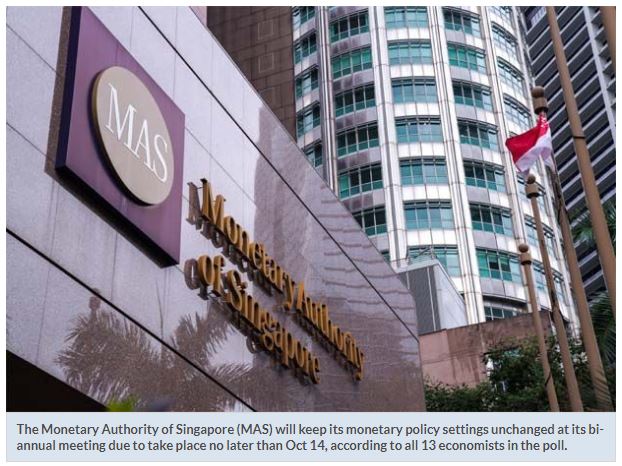Singapore central bank seen keeping monetary policy
SINGAPORE: Singapore’s central bank will likely keep policy settings steady in October on hopes the economy will recover as the financial hub further loosens coronavirus curbs and on expectations fiscal policy will be the main driver of a rebound, a Reuters poll showed.
The Monetary Authority of Singapore (MAS) will keep its monetary policy settings unchanged at its bi-annual meeting due to take place no later than Oct 14, according to all 13 economists in the poll.
It comes as the transport and tourism hub faces its biggest downturn ever, as the coronavirus pandemic is seen wiping out years of economic expansion.
“Domestic demand is likely going to recover with the mobility restrictions set to further ease in the fourth quarter, but external demand remains uncertain as trading partners continue to grapple with Covid-19 outbreak, ” said Sung-Eun Jung at Oxford Economics, betting the MAS would maintain its accommodative stance.
Singapore’s central bank manages monetary policy through exchange rate settings, letting the local dollar rise or fall against the currencies of its main trading partners within an undisclosed band.
It delivered its biggest easing move since the 2009 financial crisis at its March meeting, by flattening the band’s rate of increase and effectively shifting its centre lower.
The MAS has said fiscal policy was the “centrepiece” of the economic response to the pandemic.
The government has pumped nearly S$100bil (US$72bil) worth of stimulus into the economy.
Economists say the worst may be over for the bellwether economy that contracted a record 13.2% year-on-year in the second quarter, but warn the recovery is likely to be sluggish.
With Covid-19 case numbers falling locally, the country has been gradually lifting some of its lockdown measures to reopen its economy in recent months and signalled it wants to slowly resume tourism and travel.
The trade reliant-economy’s exports have mostly held up this year, supported by global demand for Singapore’s pharmaceutical products, but there are concerns about whether export growth is sustainable given the sluggish global economy. — Reuters


 English
English




